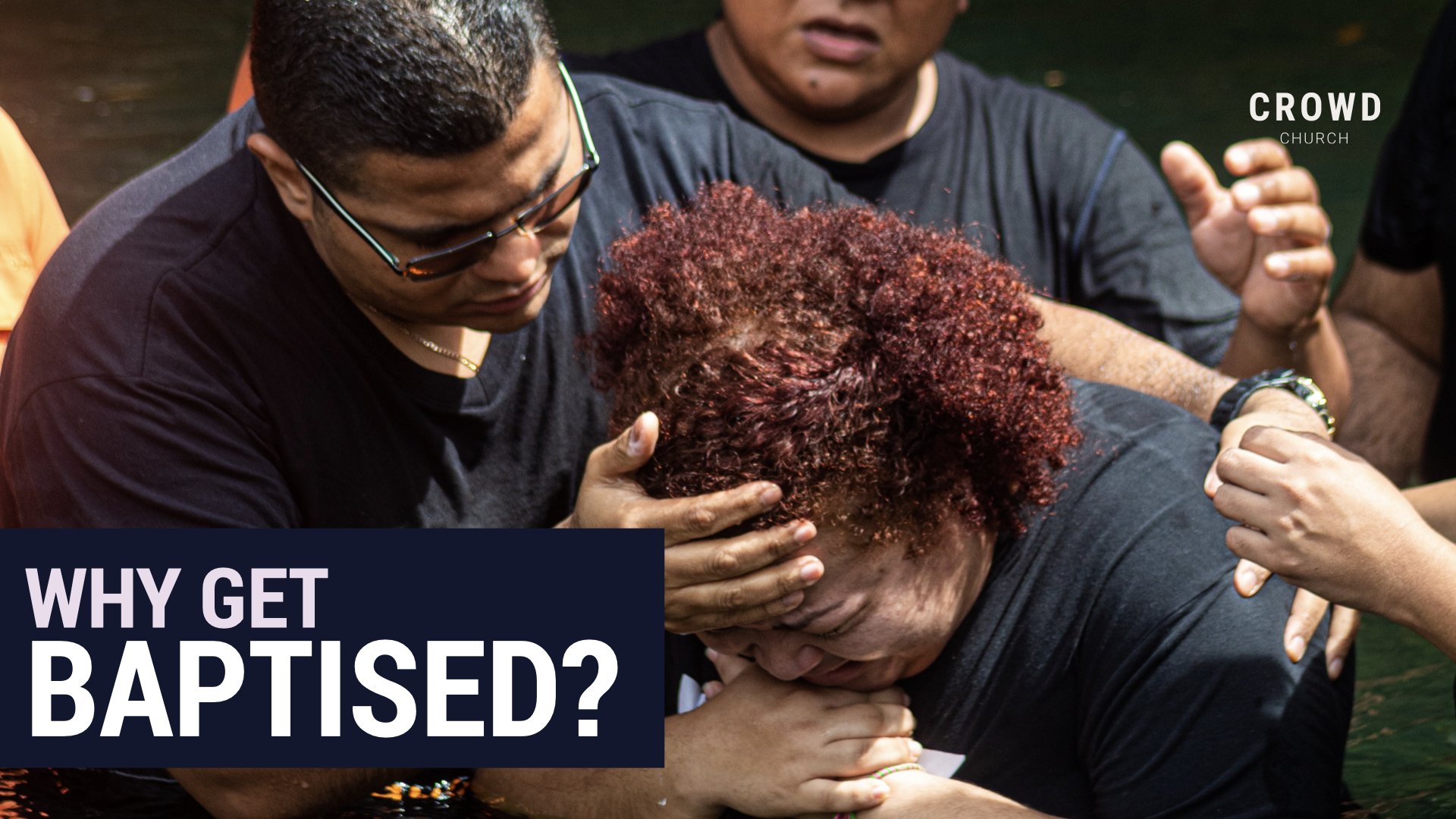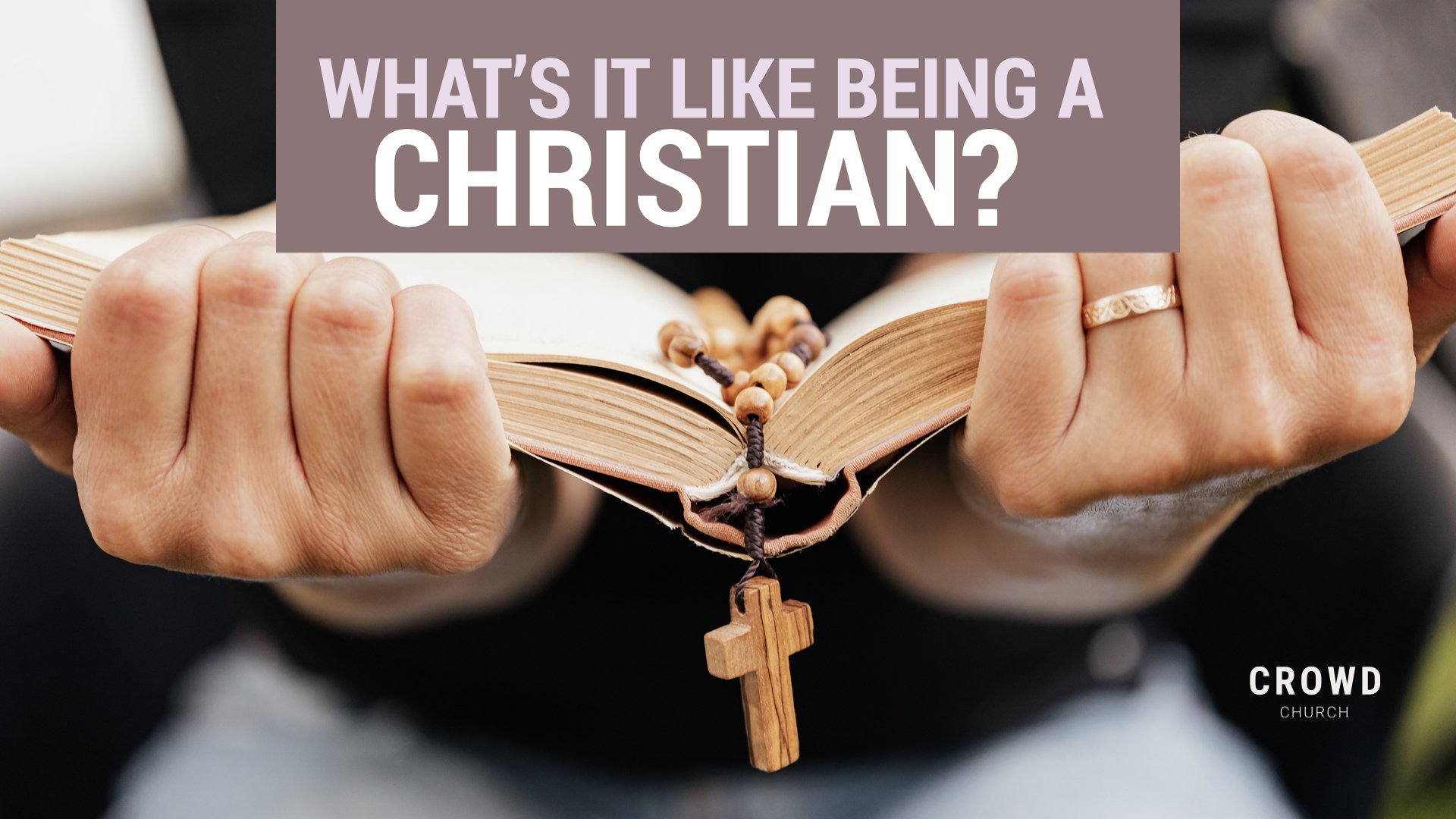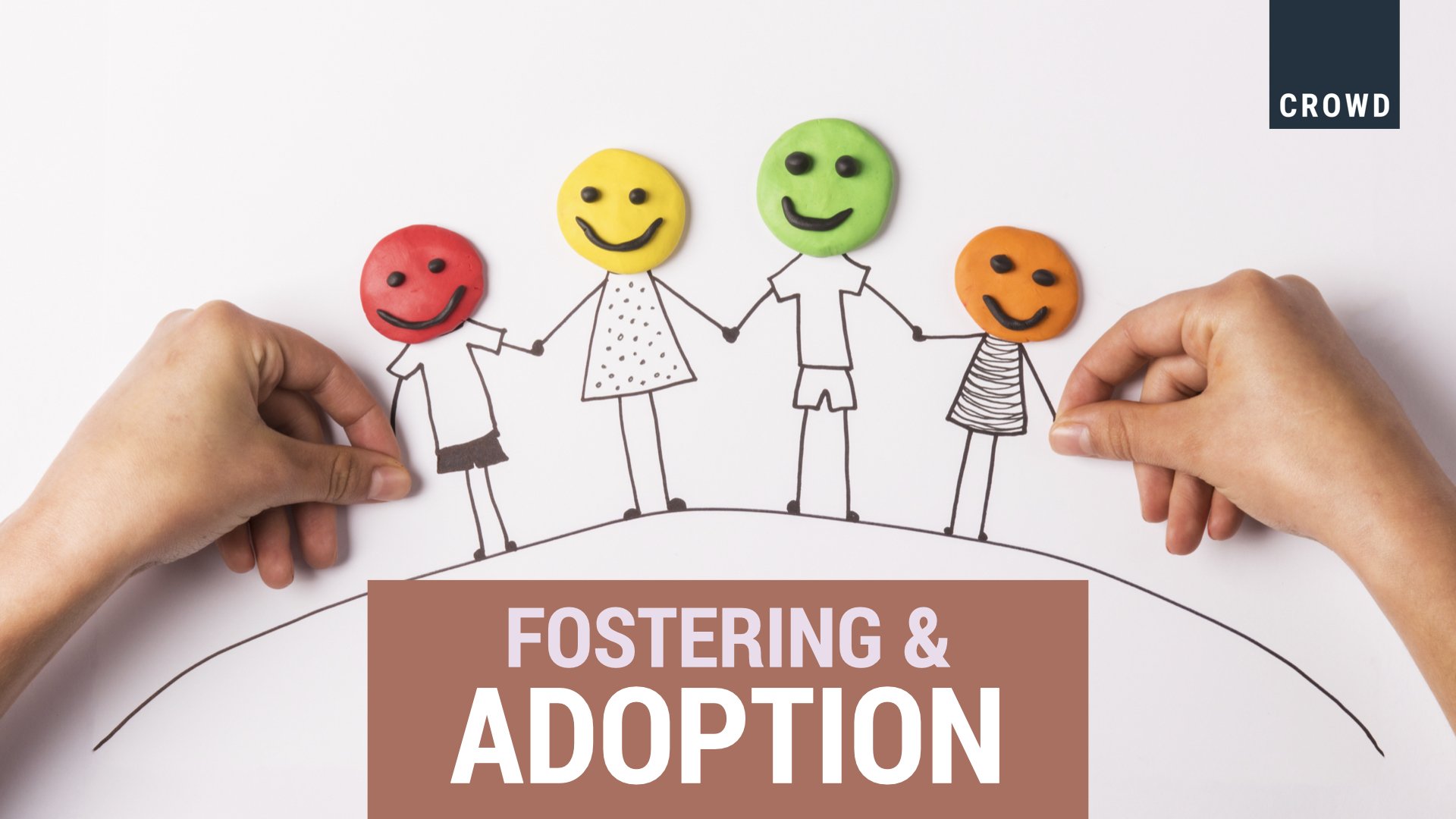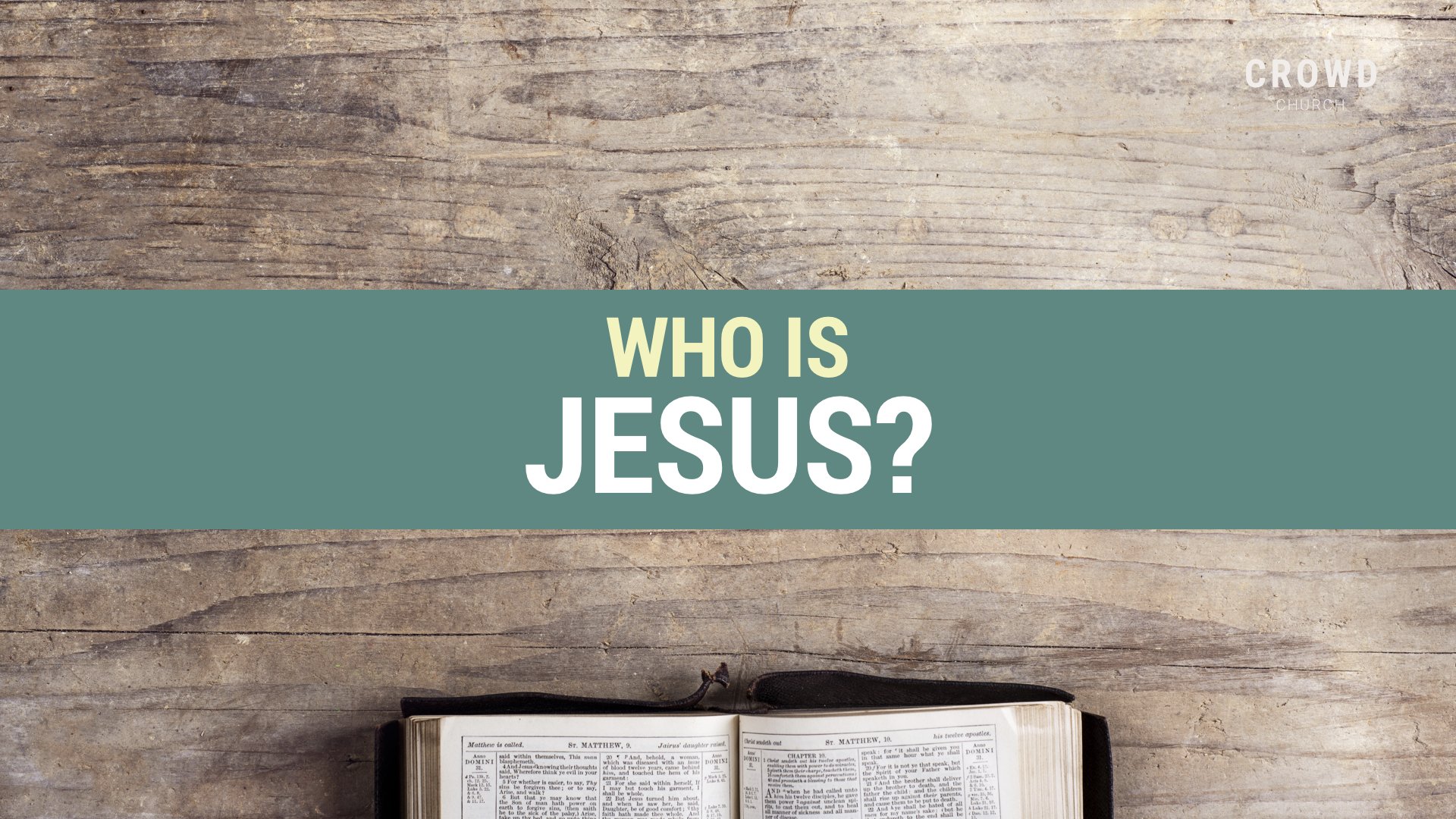What Does The Bible Say About Trusting in God?
Video Timeline
WELCOME
0:00 - Welcome with Matt & Anna
TALK with Esther Richards
05:22 - What Does The Bible Say About Trusting In God?
05:53 - Is God Trustworthy?
15:00 - What Does Trusting In God Mean?
20:46 - What Happens When We Trust In God?
PRAYER
24:26 - Prayer For Ukraine
WORSHIP
27:00 - What A Beautiful Name with Lyrics
CONVERSATION STREET with Matt & Anna
31:04 - Conversation Street
32:04 - What Does It Mean To Trust God?
34:02 - Are There Different Types Of Trust?
36:30 - For How Long Should One Trust God Even When Things Don't Seem To Happen?
39:14 - How To Trust God Through Disappointments?
45:30 - Can We Expect Everything To Go Away Just Because We Prayed About It?
46:42 - What Can We Learn From Gideon's Hesitation To Obey God?
48:06 - Is It Okay To Test God?
54:15 - What To Do If You're Struggling To Trust God?
CLOSING WORSHIP
01:01:26 - King Of My Heart with Lyrics
Podcast:
What does the Bible say about Trusting in God?
— Esther Richards
To understand what the Bible says about trusting in God, we're going to look at three questions. And we're going to look at different stories and passages in the Bible to help us answer these three questions. So those questions are,
Is God trustworthy?
What does trusting God mean?
What happens when we trust in God?
Let's unpack the first question.
#1 - Is God trustworthy?
There's a story in the Bible in the book of Judges, about Gideon and the Midianites. So the story happens over chapters six and seven. Basically, in chapter six, we see God telling Gideon that Gideon is going to be the one to rescue the Israelites from the Midianite army. So the Midianite army is camped around where the Israelites are staying. They are invading that land, they are ruining crops, and just causing a lot of issues for the Israelites and the Israelites need to be rescued. And God is calling Gideon to be the one to lead the efforts to defeat the Midianites. Gideon asks God lots of questions. And God gives Gideon various signs to show that this is what He's asking him to do. So Gideon hears God and agrees that he is going to be the one to lead the fight against the Midianites. And we read in Judges chapter seven verses one to eight.
“Early in the morning, Jerub-Baal (that is, Gideon) and all his men camped at the spring of Harod. The camp of Midian was north of them in the valley near the hill of Moreh.
The Lord said to Gideon, “You have too many men. I cannot deliver Midian into their hands, or Israel would boast against me, ‘My own strength has saved me.’ Now announce to the army, ‘Anyone who trembles with fear may turn back and leave Mount Gilead.’” So twenty-two thousand men left, while ten thousand remained.
But the Lord said to Gideon, “There are still too many men. Take them down to the water, and I will thin them out for you there. If I say, ‘This one shall go with you,’ he shall go; but if I say, ‘This one shall not go with you,’ he shall not go.” So Gideon took the men down to the water.
There the Lord told him, “Separate those who lap the water with their tongues as a dog laps from those who kneel down to drink.” Three hundred of them drank from cupped hands, lapping like dogs. All the rest got down on their knees to drink. The Lord said to Gideon, “With the three hundred men that lapped I will save you and give the Midianites into your hands. Let all the others go home.”
So Gideon sent the rest of the Israelites home but kept the three hundred, who took over the provisions and trumpets of the others. Now the camp of Midian lay below him in the valley. ”
So God has asked Gideon to do a few seemingly bizarre things. Firstly, he's asked Gideon to reduce his army from 32,000 men to just 300 to fight this huge army that's causing them all of these problems. Not only this, but God asks Gideon to do this in a strange way through multiple different instructions and instructions that we don't necessarily understand when we read them. So Gideon heard these and also may have been confused as to what God was asking him to do. Nevertheless, he trusted that God knew what He was doing. And he did it anyway. And he ended up with just 300 men in his army. We see in chapter seven, from verse 9 to verse 12.
“During that night the Lord said to Gideon, “Get up, go down against the camp, because I am going to give it into your hands. If you are afraid to attack, go down to the camp with your servant Purah and listen to what they are saying. Afterward, you will be encouraged to attack the camp.”
So he and Purah his servant went down to the outposts of the camp. The Midianites, the Amalekites and all the other eastern peoples had settled in the valley, thick as locusts. Their camels could no more be counted than the sand on the seashore.”
This description gives us quite an impressive idea of just how many people are in this opposing army of the Midianites. It says that there are so many camels in the army, that you could no more count them the same way that you can't count the amount of sand that's on a seashore. That's a lot of camels! And Gideon now only has 300 men. And God says to him, if he went and looked at the army, he would be encouraged to fight. I don't know about you. But if I saw an army that big and only had 300 in my own, I wouldn't feel that encouraged to fight. So how does God keep his word and still encourage Gideon despite what he's seen? Well, that happens in verses 13 to 15. And it says this,
“Gideon arrived just as a man was telling a friend his dream. “I had a dream,” he was saying. “A round loaf of barley bread came tumbling into the Midianite camp. It struck the tent with such force that the tent overturned and collapsed.” His friend responded, “This can be nothing other than the sword of Gideon son of Joash, the Israelite. God has given the Midianites and the whole camp into his hands.” When Gideon heard the dream and its interpretation, he bowed down and worshiped. He returned to the camp of Israel and called out, “Get up! The Lord has given the Midianite camp into your hands.””
So God is true to his words. And as soon as Gideon came back from looking at how many people there were in the Midianite army, he overheard this conversation between these two men, and he was immediately encouraged, and he immediately praised God, prayed and worshipped God, and called out loud for everyone to get up, proclaiming that God had already given the Midianite army into their hands despite the fact that they hadn't even fought yet. So that is how encouraged Gideon feels after going and seeing the camp and God showing him this conversation and this dream. We've got an army of 300 men ready to fight an army that's so big, it can't be counted. Yet God has said that the army of 300 will win. So can God be trusted? We read in verses 16 to 23 what happens next.
“Dividing the three hundred men into three companies, he placed trumpets and empty jars in the hands of all of them, with torches inside. “Watch me,” he told them. “Follow my lead. When I get to the edge of the camp, do exactly as I do. When I and all who are with me blow our trumpets, then from all around the camp blow yours and shout, ‘For the Lord and for Gideon.’”
Gideon and the hundred men with him reached the edge of the camp at the beginning of the middle watch, just after they had changed the guard. They blew their trumpets and broke the jars that were in their hands. The three companies blew the trumpets and smashed the jars. Grasping the torches in their left hands and holding in their right hands the trumpets they were to blow, they shouted, “A sword for the Lord and for Gideon!”
While each man held his position around the camp, all the Midianites ran, crying out as they fled. When the three hundred trumpets sounded, the Lord caused the men throughout the camp to turn on each other with their swords. The army fled...”
So Gideon's army won. The Midianites ended up fighting each other and fleeing to all sorts of different places. The Israelites then pursue them, it says a bit later on, and Gideon's army won just as God had promised. This is a great example in the Bible of how God is trustworthy. To such an extent that we don't even need to understand the things that God is doing and the ways that he is working, yet we can trust him despite that. God comes through for us every single time, we can definitely trust him. He is trustworthy.
And there are countless other stories in the Bible of God being trustworthy and giving seemingly odd instructions as well. Just like how God tells Noah to build the ark. Noah trusts him. And the flood does happen and God is trustworthy. And when God instructed Moses to go to Egypt and save the Israelites, Moses didn't want to do it. It seemed like such a huge, massive task yet God was trustworthy, and he saved them. All of these stories all throughout the Bible, there are countless, God is a God who keeps his word, he comes through, he has your back and he is completely trustworthy.
#2 - What does trusting in God mean?
So to see what the Bible says about this, we'll go to the book of Philippians in the New Testament, chapter four, verse six, which says this,
“Do not be anxious about anything, but in every situation, by prayer and petition, with thanksgiving, present your requests to God. ”
I really like this as a way of explaining what it means to trust God, that when something feels like it's going wrong, rather than being fearful and anxious about things, we can go to God, we can pray, and we can ask Him to help us. But we do that in a way where we bring thanksgiving to him. And a great example of this is in the book of Job in the Old Testament, where Job is afflicted and has really horrible things happen to him. And one of the first things he does is worship and speak the truth about who God is.
So we can do that, we can present our requests to God, we can go to him with the things that we have because he is trustworthy, and we can tell Him and ask Him for what we need. And it means that we don't need to be anxious, it's easier said than done. But, indeed, we do not need to be anxious because we can bring what we have to God and we can trust him. There's also a verse in Proverbs, that explains what it means to trust God, in chapter three, verses five to seven. And it says,
“Trust in the Lord with all your heart and lean not on your own understanding; in all your ways submit to him, and he will make your paths straight. Do not be wise in your own eyes; fear the Lord and shun evil. ”
So again, this is saying that we should trust that God knows what he's doing better than we know what we're doing. When it says to not lean on your own understanding, this is talking about having a conscious and intentional dependence on God. It's not about just trying to get through in life and praying when things go wrong. But it's deciding that God knows what he's doing more than we do, that we are going to lean on him in everything, just as we may lean on something physical to support us, like a tree or a wall or something like that. And we have to acknowledge God, observe him, and get to know him as we live. And as we trust in Him, it's a daily thing that we get to do.
The analogy of a bike
I recently got married, and I went on a honeymoon with my husband, to Croatia. And we hired these electric bikes to cycle around one of the little islands that we were on that day. And that was just really, really steep hill. And the path was very rocky, it was chalky and uneven and really bumpy. And there were these teeny tiny little rocks. And every time I would brake with my bike the wheel would skid to the side and I'd feel like I was about to fall off. And I'm not very graceful on a bike. And I was not being very brave at all. And I found the whole thing quite stressful. Just on that path, the rest of it was great.
And I had a moment where I was cycling down this hill, and I was so tense and I was so afraid. And I just took a breath. And I said just relax. I relaxed my shoulders and my arms and tried to not hold on quite so tightly to the handlebars. And I found that once my body had relaxed, it was a lot easier. When I decided that the bike was built to go on this sort of terrain, that I needed to trust the design of the bike, trust that the wheels would stay upright as long as I kept pedaling, it became so much easier and a lot more enjoyable. And then, soon after that, we hit the tarmac, and everything was a lot easier.
But even as that happened, I was thinking about this talk and thought it actually was a really helpful analogy of what it means to trust God, that things can be scary and stressful. We can be afraid that we're going to fall and that we're going to hurt ourselves. Something bad is going to happen to us. But we don't always have the opportunity or the option to stop and get off the bike so to speak. But just as I trusted that the bike wheels were designed well that they would take me where I needed to go, that they would keep me upright, we can trust that God knows what he's doing. God is capable.
When we relax and lean into God and what He has for us, the journey doesn't necessarily get any less bumpy. But if we can be less fearful, and we can be less anxious, we can trust in Him and it becomes more enjoyable. And sometimes in our lives, we do hit the tarmac when we're cycling, and it's much easier to go through. But life isn't always like that, sometimes the road is bumpy. But when we lean into God, when we trust in Him, we know that we are always going to be safe, we are always going to be protected, and looked after. And you'll be pleased to know I did not fall off my bike. And that analogy leads me on to our final question.
#3 - What happens when we trust in God?
So many, many parts of the Bible that tell us what happens when we trust in God. And one of them is the next verse in the Philippians passage that we read earlier in chapter four, which is verse seven, which says,
“And the peace of God, which transcends all understanding, will guard your hearts and your minds in Christ Jesus. ”
And later on in the same chapter and verse 19, it says,
“And my God will meet all your needs according to the riches of his glory in Christ Jesus. ”
Now, these two verses don't mean that we will get everything that we want whenever we ask for it. But what it means is that God provides us with what we need when we need it. Again, it's about trusting that God knows better than we do when it comes to timing and leaning on him rather than ourselves. But what happens when we trust God is that He provides and that we find peace. In Isaiah 26, verses three and four, it says,
“You will keep in perfect peace those whose minds are steadfast, because they trust in you. Trust in the Lord forever, for the Lord, the Lord himself, is the Rock eternal. ”
Again, this verse is telling us that when we trust in God, we will find peace, we will be kept in perfect peace is what it says and this is the kind of trend or the theme of what the Bible says about trusting in God that when we trust in Him, we will find peace. Again, in Isaiah chapter 12, verse two, it says,
“Surely God is my salvation; I will trust and not be afraid. The Lord, the Lord himself, is my strength and my defense; he has become my salvation. ”
Again, it says that when we trust, we don't have to be afraid, because God is our salvation, God is our defense, and He will keep us safe. And we will have peace.
Trusting in God is about trusting that he is the one that saves us. It's about knowing that there's nothing we can do to tick enough boxes, or to do things right or do things the good way, that will earn our salvation. God is the one that saves us. God is the one that keeps us safe. God is the one that brings us peace that will actually last. He is the one that we can trust in everything forever because he never changes. That's what it means to trust God. He is our salvation. He is our defense, He keeps us safe, and He will provide us peace.
CONVERSATION STREET
With: Matt Edmundson & Anna Kettle.
What is Conversation Street?
Conversation Street is part of our live stream, where the hosts (in this case, Matt & Anna) chat through Esther’s talk and answer questions that were sent in through the live stream. To watch the conversation now, click here.
What does it mean to trust God?
Matt Edmundson - Great talk, fascinating topic, this whole idea of trusting God. Anna, you've been a Christian a while, I've been a Christian a while. But if someone is watching the Livestream, and they're maybe unchurched or never gone to church, never really got their head around this whole idea of trusting God, how do you explain it when talking to people and they just go, "What do you mean you're trusting God? How does that even work?"
Anna Kettle - Yeah, I mean, it's a big one, isn't it? Even as someone who's grown up around Christianity my whole life, I don't feel like I've got it sussed fully, I feel like it's something I'm having to remember and learn and keep learning about all the time. You think you may be doing quite well when life is going well and things are turning out for you, your prayers get answered, and then life throws some curveballs at you. And it's harder to trust God, isn't it? Something goes unexpected and then suddenly, that's when it's hard to trust God.
Do we ever stop learning that as Christians? I feel like it's a lifelong lesson for me. I'm a bit of a control freak as well by nature. I think most of us are to an extent. We like to feel like we're in control of our own lives. Then life happens. And you realize you're not in control of everything. And so yeah, I feel like it's an ongoing lesson to trust God. And what do we mean by that? I guess just knowing that He's bigger than what's going on, that He's got everything covered even if life doesn't look exactly as you're expecting, or doesn't always go the way you want, that He's over it all, and He's somehow gonna make it alright, in the end. That for me is trusting God.
Are there different types of trust?
Matt - This whole idea of trusting God, I suppose for a lot of people who maybe are outside of the church, just seems like a really strange concept, a really strange idea. And I think you're right, from a Christian point of view, it's always easier to trust God when life is going well. It's when it becomes complicated and messy, that it just seems a little bit more complex.
I was thinking about this as Esther was talking. I feel like there are different types of trust. And what I mean by that is there's a general trust that I have in God, the Bible calls it eternal hope, that there is heaven, that I might not understand everything here, but ultimately I know where I'm heading and life is good. And I can trust that God is good. Even when I don't necessarily understand what's going on around me. And I just have this pervading trust in my life.
But then there are specific things that you can trust God for. And the story that Esther used, the story of Gideon, was Gideon could trust God to help him win that particular battle, right? Because he heard God in that specific instance. And I feel like, in life, there's a general trust in God we can have. But there are also specific instances where we feel like God has said something that we can trust and believe. Does that make sense?
Anna - Yeah, absolutely. I think so. And I think it's easier to trust when you know God's said something quite specific to you. There are some really good questions here, actually, people have posted a few. Matt Crew, for example, has said, "How long should I trust God's promises over my life? Why do I keep having disappointments when I've trusted in God over stuff and it comes to naught?"
For how long should one trust God even when things don't seem to happen?
Matt - Disappointment comes when the outcome is different from what we either hoped for or expected. So when something doesn't go how we hoped for or planned for, or thought it should, we are disappointed. And so that I think as Christians, that disappointment can often get pointed to or directed to God, because we feel like God should have done something different from what the current outcome was. And that's a very real and legitimate emotion and I don't know anybody that's not had that. Anna, maybe you can correct me if I'm wrong, whether there's one overriding simple way to answer this question.
Anna - No, I think it's so personal to different situations and experiences, isn't it? I get what you're saying. I've shared previously on crowd church about us not being able to have the family we wanted. That is a huge area where I felt disappointed by God, disappointed by the outcome, but life gave us that. And, we really trusted God in that, we really hoped. We hoped for a different outcome and trusted God for a long time and prayed a lot about it. And that different outcome that we would have liked didn't happen, won't materialize. And so, there's a time of making peace with that. So for me, it's been like a learning curve that just because I hope or long for something doesn't mean I'll always get that.
So for me, there's a difference there between the outcome I want now and an eternal outcome. And I know God will make all things right in the end, in the eternity of time, but that doesn't mean everything's gonna work out on this earth. Because it's broken and imperfect. Life doesn't always go the way it should. So it's hard to get your mind around it.
How to trust God through disappointments?
Matt - I guess one of the questions that comes out of that is how do you learn to trust God amid disappointments? So you've very kindly shared about the miscarriages in the past and not having a family on Crowd church. You can go back and watch those if you'd like to hear Anna's story.
And I think sometimes the outcomes don't happen because we've not heard God With Gideon, God wills his army down from 30,000 to 300. I'd have been the guy that would have gone No, no I'm going in with 30,000. So I think sometimes we hear God in terms of the outcome, but we miss God in terms of the direction and the strategy, and actually, you can get so deep into this, you know, in terms of why things haven't happened. And the most common answer is we just don't know. And I sit here, realizing that I don't have to protect God's reputation. I do know that God is good. But I also know that life often throws these curveballs. So how did you and Andy regain trust in God following that disappointment?
Anna - I suppose it was zooming out of our personal situation. God never said to us, I guarantee you'll get exactly the family you want. To be honest, that was what we wanted and hoped for and prayed for, for a long time. And what we tried to trust God for, but he never actually promised that to us. So there was that, but then also, I think the way we've handled it is to sort of zoom out of our own situation, even though that outcome and what we wanted didn't work in the sort of grand scheme of things, that doesn't make God untrustworhy. You can still trust that God is who He says he is and will do what he says He will do.
It was about depersonalizing it and looking at the bigger picture. And realizing that we live life in the middle, don't we? If you look at the Christian faith unfolding, you've got the garden of Eden and then the fall, and you can go through the whole story and we live in this middle, imperfect world right now. And then one day, there's this promise, at the end of human time, that God will make all things right, restore and redeem and heal everything that's broken right now in our world. And as Christians, we live in this weird middle, where we live in a promise of God, but also, not all its promises are complete yet.
And so, I find it easier to trust God when I look at the big picture, that it's not all done yet. We're still in the middle. And that means that not everything quite adds up. I loved some of the verses that Esther spoke about, like not leaning on your own understanding. And I think that's the key, that actually, there are some things in this world that you just can't understand, and you will never fully understand. And like you say, Matt, you can't sit here and defend God's reputation of the things that have disappointed us in life. Because we don't speak for God, do we? And we don't understand everything. And we don't see the whole picture.
And so I think that for me, there's just been some element of thinking that it's disappointing and it's hard. I'm not God and I don't see the whole picture. And there are some things now that I don't see that one day I'll see. So I suppose that's where trust really exists. Really trusting God is trusting that we don't know everything.
Matt - That's such a powerful point. Like it'd be great if Liverpool won the quadruple, that would be inspiring. I have a wish list of things that you know, if they happen, that's awesome. But fundamentally, what I find deeply, deeply inspiring is people who have faced incredibly difficult times in life, incredible situations and circumstances, but in the midst of it, they've gone, I don't get it, I don't understand it but God I'm still gonna trust you in the middle of it and like you and Andy become the sweetest, most inspiring people because faith there becomes very, very real.
I think it's important to recognize there's disappointment and it's okay to do that. But to get to a place where you go, "I'm still going to trust you, God". Andy's put it here in the comments, "It's easy for Christians to expect things to all workout. It's possibly a dangerous mindset, as it could end in unexpected disappointment. For example, someone praying before exams expecting to pass because they've prayed about it." And I think that's a really interesting point.
Can we expect everything to go our way just because prayed about it?
Anna - Prayer is powerful, but it's not a magic wand to just wave over everything to make the world the way you want it. It goes back to that thing of control, like, a personal way of controlling our world or molding it into the shape we want it to be. Actually, trust is about giving up all rights to understand it all and control it. And believe that God, the Creator of the universe, knows what he's doing even if we don't see that.
Matt - Yeah, that is powerful. Sharon's put it here in the comments. "Yes, I agree. Jesus promised us trouble and persecution. So things are not always gonna go how we want but I prefer to focus on the happy promises." Sadaf asks, "Gideon was hesitant to obey God and showed a clear lack of faith by testing God. What can we learn from him? And how do we apply this to our lives?" You can answer that one, Anna.
What can we learn from Gideon's hesitation to obey God?
Anna - Oh, thanks Sadaf. That's a great question. Sometimes you read the Bible and you see all these people who've got so much faith and I find it reassuring that they are as hesitant and find it as difficult to trust God as we do. That's reassuring, for starters. What can we learn from him? And how do we play this into our lives?
I suppose it shows that it's okay to doubt God, it's okay to question, it's okay to not understand and be slow to trust God. And that actually, he was a work in progress just like we are and we won't always get it right. And I think God's really gracious because he uses Gideon anyway. God's great at using people who are imperfect and don't get it right and don't always respond to him in the way that they should straight away. And I find that encouraging.
Is it okay to test God?
Matt - Yeah, I agree. And Jesus talks about this when there's this really odd scenario where the devil, Satan manifests himself physically and has a conversation with Jesus. And he says, if you're the son of God, do this, and lays down this series of challenges. And Jesus' response to the devil is quite fascinating because he says, it is written, don't test God.
And I remember at university, a friend of mine came to me and he said, this God of yours, I stood there at the side of the road, and I prayed that if a yellow duck flew past and did this, and did some outlandish thing that was supposed to happen, then I would know that God's real. And he said, of course, it didn't happen. Therefore, God's not real. And I'm like, I'm not quite sure this idea of testing God is how you want to go to figure out whether God is real or not. And sometimes that mindset, I think creeps into us as Christians, this whole idea of God just needs to prove to me or show me that something's going on. And we do encounter God in our lives, but this whole idea of testing God is really quite a fascinating one. And I think we just have to be a bit careful with it sometimes. Anna, anything from you to throw in?
Anna - Yeah, I know people who've done that with God. I think I've probably done it in my own life. And sometimes it's worked, and sometimes it's not. But yeah, I agree with you, I think you have to be a bit careful. Because if you're testing Him on something he's already said in His Word, that's what Jesus is saying, I'm not gonna offend God. That example with a duck and your friend saying, if God's real, then he'll show me in this weird and wonderful way. But the Bible says that he's already showed you He's real and that He exists through creation itself, and in several different ways. And so you can't put God in a box. And I don't think it's good to start putting a test on God.
Matt - Yeah, it's fascinating. And I think Sadaf's question is an interesting one because the opposite of trusting God is disobedience, right? So Gideon could have chosen not to go to battle with 300 men, he could have done a whole bunch of different things, which would have led to all kinds of situations and problems I have no doubt. And so this not trusting God is an interesting idea as well. Right? I don't mean to put you on the spot, but have you got any examples of where you feel like you didn't trust God in certain situations?
Anna - I feel like I've had situations where I've partially trusted God and thought "Oh, well, I'm willing to take a small step out, and maybe test the water and see if God meets me there. And then I'll take the next step." Like, I remember, after I was a student, I did a a gap year with our church, Frontline. And at the time, I didn't have any money. And I didn't know whether it was a good thing to do or not straight after studying and I had already got some student debt. And part of me felt like this was the right thing to do. But I was not sure it made sense to put getting a career on pause.
So I was like, "God, if you give me the deposit I need to fill out the form and start this process, then I'll trust that you'll give me the rest of the money to do this." And so I've done things where I've not fully trusted God for the whole thing. But I've almost dipped my toe in the water and said, God, if you meet me here, I'll take the next step forward from there. Kind of like what Gideon was doing as well. He wasn't saying I'm not gonna fight, but he was like, I'm not going to do it like that God, but how about this?
What to do if you're struggling to trust God?
Matt - Okay, let me ask you one final question, Anna, and we'll draw conversation street to a close. What would you say to someone who doesn't believe that they can trust in God or who is struggling to do so right now?
Anna - I would say, firstly, it's normal. It's normal to struggle. I don't think you have to feel ashamed. It's good to be honest. I'd just say, talk to people about it. Talk to a few trusted people, and maybe just see what taking the next step towards trusting God in situations and circumstances looks like. Sometimes it's just about keeping going, even when you can't see where you're headed. What do you think Matt?
Matt - Yeah, I think you're entirely right, I think one step at a time. Trust is something that you naturally give to people over time. And my experience is that the longer I've walked with God, the more I've learned to trust him. And I think you can do that. There are tricky times and there are times when you don't understand everything. But to realize that you're not God, you can take your foot off the accelerator a little bit and go, God, I just trust you, I think is interesting.
Sharon said here, that faith comes from hearing God's word, Romans 10:17. So listening to the Bible is a good place to start with when it comes to trusting God. And if you are struggling in a certain area, I would strongly suggest you study the Bible in that area, to see what it has to say, which helps you develop your faith. And that helps you develop your trust.
Tracy wrote in the comments, "Until nine years ago, I felt let down by God after my horrific childhood. And then I went to River Camp and my life was turned around." And I think this is such an important point that actually, you can grow in errors, you can develop trust, but there can be times where you just encounter the presence and love of God in a way that you would never have expected. And He can radically transform any situation. But my experience is, ultimately, God is trustworthy, and He is a safe bet to put your trust in even when you don't understand.
Bible Verses About Trusting in God
Psalm 9:10 - Those who know your name trust in you, for you, Lord, have never forsaken those who seek you.
Isaiah 26:3,4 - Behold, God is my salvation; I will trust, and will not be afraid; for the LORD GOD is my strength and my song, and he has become my salvation.
1 Peter 5:6,7 - Humble yourselves, therefore, under God’s mighty hand, that he may lift you up in due time. Cast all your anxiety on him because he cares for you.
Jeremiah 17:7,8 - But blessed is the one who trusts in the LORD, whose confidence is in him. They will be like a tree planted by the water that sends out its roots by the stream. It does not fear when heat comes; its leaves are always green. It has no worries in a year of drought and never fails to bear fruit.
Romans 15:13 - May the God of hope fill you with all joy and peace in believing, so that by the power of the Holy Spirit you may abound in hope.
Psalm 56:3,4 - Blessed is the man who trusts in the LORD, whose trust is the LORD. He is like a tree planted by water, that sends out its roots by the stream, and does not fear when heat comes, for its leaves remain green, and is not anxious in the year of drought, for it does not cease to bear fruit.
Matthew 6:26,27 - Look at the birds of the air; they do not sow or reap or store away in barns, and yet your heavenly Father feeds them. Are you not much more valuable than they? Can any one of you by worrying add a single hour to your life?
Proverbs 3:1-6 - My son, do not forget my teaching, but let your heart keep my commandments, for length of days and years of life and peace they will add to you. Let not steadfast love and faithfulness forsake you; bind them around your neck; write them on the tablet of your heart. So you will find favor and good success in the sight of God and man. Trust in the Lord with all your heart, and do not lean on your own understanding. In all your ways acknowledge him, and he will make straight your paths.














